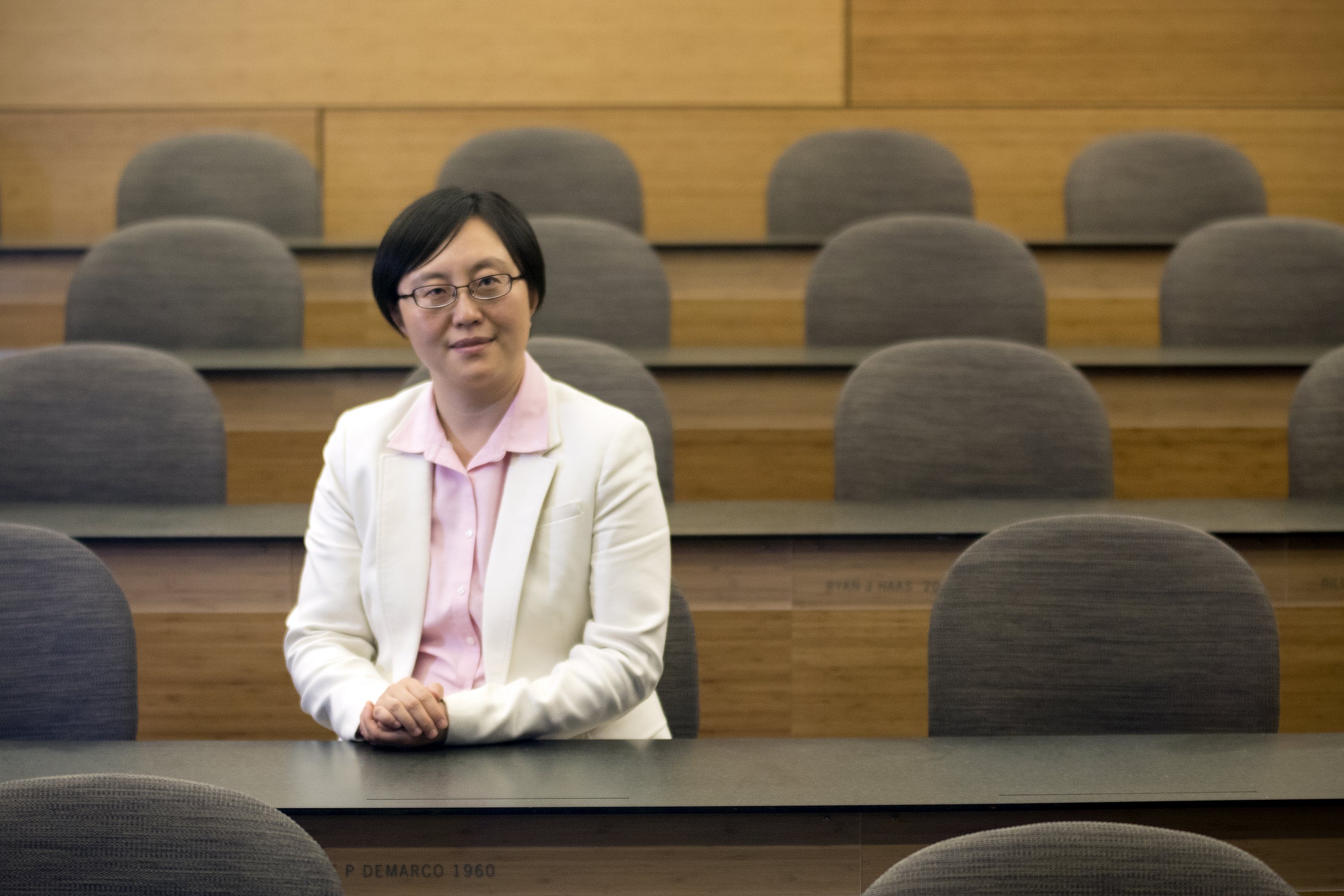
New directions in real estate practice
Professor Siqi Zheng promotes sustainable urbanization at MIT’s Center for Real Estate.
Among the courses taught by Siqi Zheng is one identifying how real estate companies can be profitable while building and operating sustainably. Her class, 11.S949 (Sustainable Real Estate), at the MIT Center for Real Estate (CRE) attracts students from throughout the MIT School of Architecture and Planning (SA+P) and MIT Sloan School of Management. Harvard University students also cross-register to attend her course.
For Zheng, the Samuel Tak Lee Champion Professor of Urban and Real Estate Sustainability, there is a sense of coming full circle.
“Like these students, I migrated from Harvard to MIT,” Zheng says. “Fifteen years ago, I was one of them. Now I attract Harvard students to my classes.”
Not only has Zheng progressed from taking courses at CRE while a postdoc at Harvard’s Graduate School of Design to joining the SA+P faculty in 2017, she assumed the role of CRE’s faculty director last summer. Among her goals in this new position is encouraging the center’s culture of sustainability and innovation — the very qualities that brought her to MIT as a student.
While Zheng’s doctoral studies focused on housing and China’s transition from a centrally planned economy to a market-based system, it was MIT’s focus on urban economics and the “clean air and blue skies” of Cambridge, Massachusetts — in contrast to the polluted air in Beijing — that altered her focus to urban sustainability.
“Back in 2006, I audited several very good courses at CRE in urban and real estate economics. It opened a window for me to say, ‘I need to study cities instead of just housing — and in a broader way — to understand urban dynamics.’ My research area became the intersection of urban economics and environmental sustainability.”
Following her postdoc, Zheng returned to Beijing and joined Tsinghua University as an assistant professor and director of its Hang Lung Center for Real Estate.
Creative urban studies research
Shortly after arriving at MIT, Zheng founded the China Future City Lab, giving her the opportunity to focus on that country’s rapid economic growth alongside the tension of more sustainable urbanization. Her research shows that Chinese urban households are willing to pay higher real estate prices to live in cities and locations with better environmental quality, and this demand has increased over time. She has also identified a substantial price premium for green buildings, which gives real estate developers a monetary incentive to build energy-efficient structures. Gradually, she says, her research and team expanded along with her interest in other fast-urbanizing countries; she renamed her lab the Sustainable Urbanization Lab.
Zheng’s research is remarkably varied and prolific, with many collaborators in the United States and overseas. Last year, Zheng was one of six MIT faculty awarded a grant from Harvard Medical School to address the effects of Covid-19. While the other researchers focused on clinical areas, such as vaccine development and diagnostic tools, Zheng’s research explored the role of social distancing in shaping Covid-19’s curve. Currently under review for publication, Zheng’s research compares how people’s sentiment in cities globally responded to the shock of the pandemic and the policies each government mandated to slow the spread of the virus.
“My overarching goal as a scholar is to build our understanding of the behavioral foundations for urban real estate and environmental actions aimed at sustainable urbanization,” Zheng says. “I look at incentives and how an individual’s behavior gets aggregated into our society and its outcomes. Last year, without a vaccine, we needed to slow the spread of the virus. We had to rely on people in all countries to socially distance. We wanted to understand the interactions between individual sentiments, voluntary behaviors, and government intervention — how they work together, and their outcomes.”
Currently, Zheng’s team is monitoring social media data to detect behavior changes in the U.S. population before and after vaccination. Their theory is that individuals — once vaccinated against Covid-19 — are happier and take part in riskier behaviors, such as restaurant dining or not wearing a mask.
“We’ve been monitoring emotional states on social media before the vaccination process began,” she says. “We can measure their emotional status and their activities from their social media posts. People lose their anxiety and fear after vaccination, and they stop taking precautions.”
Zheng began using social media data as a tool to assess a population’s emotional status several years ago, when she studied emotions in conjunction with levels of air pollution in China. Her paper, “Air pollution lowers Chinese urbanites’ expressed happiness on social media,” appeared in Nature Human Behavior in 2019, and was the journal’s fourth-most popular paper that year.
Zheng used the same approach to understand how climate change affects people in China by coupling meteorological conditions with more than 400 million social media posts from 43 million users. Finding that extreme weather worsens emotional expressions on social media allowed the researchers to project the potentially harmful impacts of global warming on subjective well-being.
CRE’s strategic directions
Working with CRE Executive Director Professor Kairos Shen, and Associate Director Lisa Thoma, Zheng is mapping out a strategic plan for CRE. One emphasis is expanding interdisciplinary research. She is excited by the new work undertaken by the center’s postdocs and doctoral students, which she sees as fostering synergy with teaching.
“This is MIT,” says Zheng. “We have excellent teaching — but that’s not enough. We need to have a strong research focus to support teaching because we need to introduce our brilliant students to the field’s frontiers.”
A parallel strategy is expanding the center’s global perspective. Zheng notes the oft-used expression “location, location, location,” pointing out that, while CRE’s attention has leaned toward the United States and Boston, half of their students are from overseas and the majority of their alumni are based in Asia. As such, she is working to expand collaborations with academic institutions and alumni who are now leaders in the field in Korea, mainland China, Hong Kong, Japan, Singapore, and India. Asia is also the region with the fastest urbanization and real estate growth potential. That’s why Zheng and her colleagues are now developing their “MIT Asia Real Estate Initiative.”
“I like creating things from scratch,” Zheng says. “The center is small, flexible, and forward-looking, so I have an opportunity to create some new exciting programs and generate new impact.”
As part of her globalization strategy, Zheng also expects to expand MIT/CRE’s online education offerings. While the center admits only 30 graduate students each year, Zheng sees opportunities for professionals in the global real estate industry to expand their education with an online certificate program. Currently, Zheng is designing six new courses to join the two already online.
Having begun her new role during the global pandemic, Zheng and her team have only worked remotely. While anxious to get to know her team members “in person and not only over Zoom,” Zheng keeps busy managing various research initiatives, teaching and deepening MIT/CRE’s global connections. She is active on her social media accounts, sharing the Center’s many research activities, industry developments, and student achievements. On weekends however, she posts photos of hiking and exploring with her husband and son.
“I want to be less intense outside of work; spending time outside surrounded by nature helps me unwind,” she says.
Reprinted with permission of MIT News

